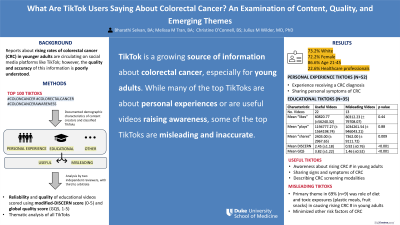Monday Poster Session
Category: Colon
P1614 - What Are TikTok Users Saying About Colorectal Cancer? An Examination of Content, Quality, and Emerging Themes
Monday, October 23, 2023
10:30 AM - 4:15 PM PT
Location: Exhibit Hall

Has Audio
.jpg)
Bharathi Selvan, BA
Duke University School of Medicine
Durham, North Carolina
Presenting Author(s)
Bharathi Selvan, BA1, Melissa Tran, BA1, Christine B. OConnell, BS1, Julius Wilder, MD, PhD2
1Duke University School of Medicine, Durham, NC; 2Duke University, Durham, NC
Introduction: Colorectal cancer (CRC) is the second leading cause of cancer mortality and there is increasing morbidity and mortality in younger adults. Simultaneously, there has been increasing discourse about CRC on social media platforms like TikTok. There is little understanding about the quality and accuracy of this content, especially on newer platforms like TikTok.
Methods: We evaluated the top 100 TikToks meeting our inclusion criteria under the hashtags #coloncancer, #colorectalcancer, and #coloncancerawareness. Two reviewers independently performed standardized video coding, with another reviewer to arbitrate differences. Videos were classified as patient experience, educational, and other. Educational videos were further classified as misleading or useful. Reliability of educational videos was scored from 0 to 5 using a modified-DISCERN score, and quality was assessed on a scale of 1 to 5 with a global quality score (GQS). We also conducted a thematic analysis of all TikToks and noted emerging themes.
Results: 97 TikToks were included in the final analysis as 3 videos became unavailable during our study. Content creators were 72.2% female, 73.2% White, and 86.6% were age 21- 45. Only 29.3% were healthcare professionals. Most portrayed patient experience (n= 52). Of the educational videos (n= 35), 22 were useful and 13 were misleading. Useful videos were significantly more reliable and higher quality than misleading videos (p< 0.001). Notably, misleading videos were “shared” more often than useful videos (p< 0.009).
Colonoscopy and CRC screening were commonly discussed in the top 97 TikToks (n= 27). Many TikToks spread awareness about rising numbers of CRC diagnoses in young people (n= 15). TikToks sharing news of the death of a young TikTok influencer, Randy Gonzalez, who shared his CRC diagnosis on TikTok were among the top videos (n= 12). Notably, the primary theme of misinformation in 69% of misleading videos (n= 9) was the role of diet in causing CRC, with proposed etiologies including toxins absorbed from “microwaved plastic meals” and fruit snacks.
Discussion: TikTok is a growing source of information about CRC, especially among users under 45 years old. Users are leveraging educational content to raise awareness about CRC diagnosis and screening. However, some of the top videos for CRC are misleading and inaccurate. Given its popularity, gastroenterologists should be aware of common themes discussed on TikTok and misleading information, particularly among younger people.
Disclosures:
Bharathi Selvan, BA1, Melissa Tran, BA1, Christine B. OConnell, BS1, Julius Wilder, MD, PhD2. P1614 - What Are TikTok Users Saying About Colorectal Cancer? An Examination of Content, Quality, and Emerging Themes, ACG 2023 Annual Scientific Meeting Abstracts. Vancouver, BC, Canada: American College of Gastroenterology.
1Duke University School of Medicine, Durham, NC; 2Duke University, Durham, NC
Introduction: Colorectal cancer (CRC) is the second leading cause of cancer mortality and there is increasing morbidity and mortality in younger adults. Simultaneously, there has been increasing discourse about CRC on social media platforms like TikTok. There is little understanding about the quality and accuracy of this content, especially on newer platforms like TikTok.
Methods: We evaluated the top 100 TikToks meeting our inclusion criteria under the hashtags #coloncancer, #colorectalcancer, and #coloncancerawareness. Two reviewers independently performed standardized video coding, with another reviewer to arbitrate differences. Videos were classified as patient experience, educational, and other. Educational videos were further classified as misleading or useful. Reliability of educational videos was scored from 0 to 5 using a modified-DISCERN score, and quality was assessed on a scale of 1 to 5 with a global quality score (GQS). We also conducted a thematic analysis of all TikToks and noted emerging themes.
Results: 97 TikToks were included in the final analysis as 3 videos became unavailable during our study. Content creators were 72.2% female, 73.2% White, and 86.6% were age 21- 45. Only 29.3% were healthcare professionals. Most portrayed patient experience (n= 52). Of the educational videos (n= 35), 22 were useful and 13 were misleading. Useful videos were significantly more reliable and higher quality than misleading videos (p< 0.001). Notably, misleading videos were “shared” more often than useful videos (p< 0.009).
Colonoscopy and CRC screening were commonly discussed in the top 97 TikToks (n= 27). Many TikToks spread awareness about rising numbers of CRC diagnoses in young people (n= 15). TikToks sharing news of the death of a young TikTok influencer, Randy Gonzalez, who shared his CRC diagnosis on TikTok were among the top videos (n= 12). Notably, the primary theme of misinformation in 69% of misleading videos (n= 9) was the role of diet in causing CRC, with proposed etiologies including toxins absorbed from “microwaved plastic meals” and fruit snacks.
Discussion: TikTok is a growing source of information about CRC, especially among users under 45 years old. Users are leveraging educational content to raise awareness about CRC diagnosis and screening. However, some of the top videos for CRC are misleading and inaccurate. Given its popularity, gastroenterologists should be aware of common themes discussed on TikTok and misleading information, particularly among younger people.
Disclosures:
Bharathi Selvan indicated no relevant financial relationships.
Melissa Tran indicated no relevant financial relationships.
Christine OConnell indicated no relevant financial relationships.
Julius Wilder: Gilead – Advisory Committee/Board Member. Janssen – Consultant. Mallinckardt – Consultant. Mirum – Grant/Research Support.
Bharathi Selvan, BA1, Melissa Tran, BA1, Christine B. OConnell, BS1, Julius Wilder, MD, PhD2. P1614 - What Are TikTok Users Saying About Colorectal Cancer? An Examination of Content, Quality, and Emerging Themes, ACG 2023 Annual Scientific Meeting Abstracts. Vancouver, BC, Canada: American College of Gastroenterology.
